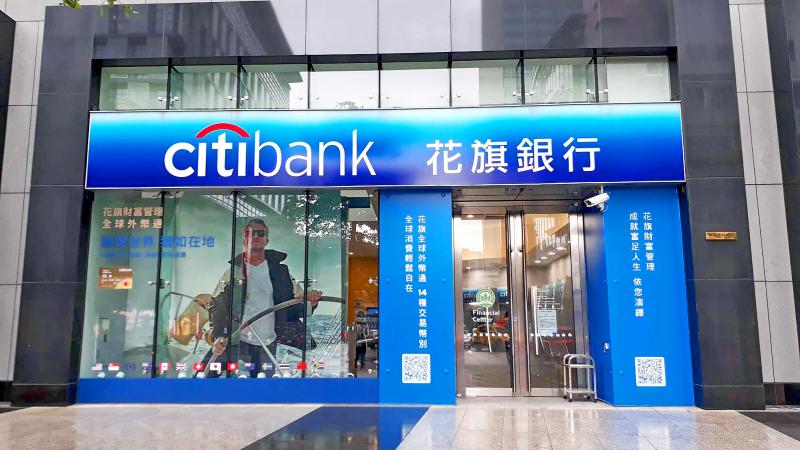As the COVID-19 pandemic drastically affects human health as well as the economy, Citigroup Inc is investing more than US$65 million in medical equipment to support frontline workers, while Citibank Taiwan Ltd (台灣花旗) is helping local families and healthcare workers.
Citigroup is passing the baton to Citibank Taiwan, which is matching dollar-for-dollar donations from its 4,000 employees nationwide, to help vulnerable families, orphans, single-parent homes and medical personnel nationwide.
Throughout the pandemic, Citibank Taiwan’s policy has been to provide its employees with a safe work environment, while continuing to provide the same level of service to its customers, Citibank Taiwan chairman Paulus Mok (莫兆鴻) said.

Photo courtesy of Citibank Taiwan Ltd
Although COVID-19 is winding down in Taiwan, many families in the nation have been hit with a drastic reduction in their income due to the pandemic’s economic effects. Affording tuition and even basic daily necessities has become a challenge for many families.
To help these families, as well as doctors on the front line, Citibank Taiwan has teamed up with nonprofit organizations the Mustard Seed Mission, the Taipei Orphan Welfare Foundation and Doctors Without Borders.
More than 35 percent of the nation’s vulnerable families are facing reduced salary, unpaid leave or even unemployment as a result of the pandemic, the Mustard Seed Mission said.
The mission thanked Citibank for its efforts to raise funds and rally 170 food banks to provide families with daily necessities including rice, noodles, canned goods, cooking oil and soap.
Working with the Taipei Orphan Welfare Foundation, Citibank aims to raise funds to help children in single-parent homes pay for tuition, as their ability to do so might have been limited by the pandemic, the bank said.
As the pandemic has not yet slowed in much of the world, Citibank also hopes that working with Doctors Without Borders could help doctors slow the spread of the disease.
Citibank employees nationwide have donated funds to subsidize the purchase of medical equipment for doctors in vulnerable areas.
The bank would continue its fundraising efforts to help disadvantaged families in Taiwan and to help purchase medical equipment for frontline doctors until the end of August, and Citibank would continue to match all donations made by employees nationwide.
“Let’s put our heart into this, and join hands to build a post-epidemic world of caring, Citibank said.

NEW IDENTITY: Known for its software, India has expanded into hardware, with its semiconductor industry growing from US$38bn in 2023 to US$45bn to US$50bn India on Saturday inaugurated its first semiconductor assembly and test facility, a milestone in the government’s push to reduce dependence on foreign chipmakers and stake a claim in a sector dominated by China. Indian Prime Minister Narendra Modi opened US firm Micron Technology Inc’s semiconductor assembly, test and packaging unit in his home state of Gujarat, hailing the “dawn of a new era” for India’s technology ambitions. “When young Indians look back in the future, they will see this decade as the turning point in our tech future,” Modi told the event, which was broadcast on his YouTube channel. The plant would convert

‘SEISMIC SHIFT’: The researcher forecast there would be about 1.1 billion mobile shipments this year, down from 1.26 billion the prior year and erasing years of gains The global smartphone market is expected to contract 12.9 percent this year due to the unprecedented memorychip shortage, marking “a crisis like no other,” researcher International Data Corp (IDC) said. The new forecast, a dramatic revision down from earlier estimates, gives the latest accounting of the ongoing memory crunch that is affecting every corner of the electronics industry. The demand for advanced memory to power artificial intelligence (AI) tasks has drained global supply until well into next year and jeopardizes the business model of many smartphone makers. IDC forecast about 1.1 billion mobile shipments this year, down from 1.26 billion the prior

People stand in a Pokemon store in Tokyo on Thursday. One of the world highest-grossing franchises is celebrated its 30th anniversary yesterday.

Zimbabwe’s ban on raw lithium exports is forcing Chinese miners to rethink their strategy, speeding up plans to process the metal locally instead of shipping it to China’s vast rechargeable battery industry. The country is Africa’s largest lithium producer and has one of the world’s largest reserves, according to the US Geological Survey (USGS). Zimbabwe already banned the export of lithium ore in 2022 and last year announced it would halt exports of lithium concentrates from January next year. However, on Wednesday it imposed the ban with immediate effect, leaving unclear what the lithium mining sector would do in the